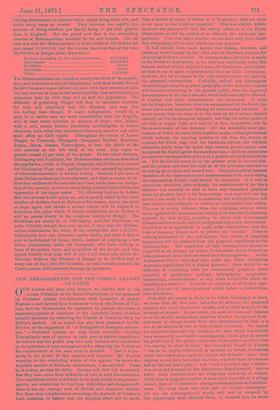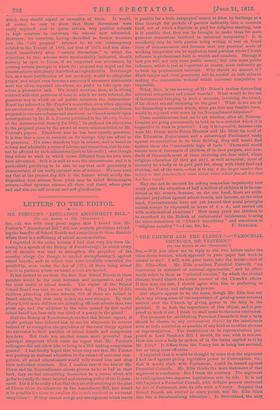NEW ARRANGEMENTS FOR THE COMING TRANSIT OF VENUS.
OUR readers will learn with interest, we believe, that at the recent Visitation of the Royal Observatory, it was proposed by Professor Adams (co-discoverer with Leverrier of distant Neptune), and carried by a unanimous vote of the Board of Visi- tors, that the Government be requested to provide the means of organising parties of observers in the Antarctic Ocean, to select suitable localities for observing the Transit of Venus in 1874, by Halley's method. As an appeal has also been addressed by Mr. Proctor, at the suggestion of "a distinguished European astrono- mer " — Profeseor Adams, we may safely conclude — inviting Transatlantic men of science to take part in similar expeditions, we believe that the public may now look forward with confidence to the provision of such arrangements for observing the Transit as the requirements of the case seem to demand. " That it is per- fectly in the power of this country and America," Mr. Proctor remarks, in the concluding words of this appeal, "to insure the requisite number of Southern observations, I am satisfied. There is, it is true, no time for delay. Energy and skill will be wanted, but they have never been looked for in vain in such circumstances. The expeditions which would have to be made would be no pleasure- parties, nor would they be free from difficulties and dangers suffi- cient to tax the courage even of British and American seamen. But these very considerations encourage the students of Science in both countries to believe that the required effort will be made.
That it should be made, if failure is to be averted, does not seem to me open to the slightest question." This was written before the news was announced that the strong influence of the Royal Observatory would be employed to advance the necessary pre- parations. Now that this is known, we can have very little doubt that everything will be done which the case requires.
It had already been made known that Russia, America, and Germany would occupy no leas than sixteen Northern stations for employing Halley's method. If corresponding provision is made in the Southern hemisphere, as we may now reasonably hope, this famous method will be employed more effectively than ever before, or than it can be again employed until the year 2012. Astronomy, however, will by no means be the only science which will gain by the proposed explorations. Probably, indeed, the information obtained respecting the physical geography of the Antarctic regions will be more interesting to the general public than the improved determination of the Sun's distance which will assuredly be effected, if weather and other circumstances are favourable. It must not be forgotten, however, that the measurement of the Sun's dis- tance has a most important bearing on astronomical relations. It is not merely that our ideas as to the scale of the Universe depend entirely on this fuudamental estimate, but that the actual power of our Sun to supply light and heat is, in fact, measurable only by the measurement of his distance. All the wonderful solar phe- nomena of which we have lately heard so much,—those phenomena which indicate the amazing activity of our Sun, the storms of cyclonic fire which rage over his enormous surface, the volcanic outbursts which from far below that surface propel matter even to beyond the Earth's great distance from these operations are more or less stupendous as he is at a greater or less distance from us. For the farther away he is, the greater must be his real size, and the greater therefore the scale of all the processes observed to be taking place upon and around him. The philosophical interest therefore of the observations and measurements to be made during the approaching Transit could hardly be surpassed. It is well to -remember, moreover, that although the measurement of the Sun's distance can scarcely be said to have any recognised practical value (at present, for it is far from certain that none will one day accrue,) the work to be done in mastering this noble problem will lead directly and indirectly to results of considerable real utility. The case is widely different from the surprising scheme which lately agitated the Astronomical Society (but was most fortunately rejected by that body), according to which new Government Observatories were to be erected, and presumably a uew Astronomer- Royal was to be appointed, to make solar observations with the hope of learning thence how to predict the weather I There is nothing chimerical in the anticipation that results of practical importance will be obtained from the proposed expeditious to the Southern Seas. The expression of such anticipations cannot be regarded as an attempt to secure Government aid to Science on false pretences, since they are based on a long experience. As the Astronomer-Royal remarked nine years ago, when advocating Antarctic expeditions for a similar purpose, " there would be no difficulty in combining with the astronomical questions other inquiries of geography, geology, hydrography, magnetism, meteorology, natural history, or any other subject for which the localities are suitable." It would be contrary to all former expe- rience, if results of great practical utility failed to follow from such researches.
Now that the matter is likely to be taken thoroughly in hand, we trust that all who have influence to advance the proposed schemes will exert themselves loyally, and to their utmost, in the interests of science. In particular, we must not have any disputes as to the utterly unimportant question whether the present desir- able state of things results from this circumstance or that, or is due to the labours of this or that student of science. We cannot too earnestly deprecate, for instance, the tone which has already been assumed by a scientific contemporary, which gravely assures the public (as if the public could care about such a matter !) that "in coming to their decision" the Greenwich Board of Visitors " was in no degree influenced or assisted by certain discussions which have taken place upon the suliject out-of-doors;" that "their decision would have been just the same, whether these discussions had or had not taken place ;" and " that it is in fact only a realisa- tion of an old proposal of the Astronomer-Royal himself ;" and so forth. Such considerations are altogether unworthy of science. Their tone is suggestive rather of some petty squabble in a village school, than of a discussion among mathematicians aud astrono- mers. We trust those who took part in " certain discussions " (to use our contemporary's words) will not be tempted, by the opportunity thus afforded them, to descend into an arena which they should regard as unworthy of them. It would, of course, be easy to show that those discussions were really required, and to quote certain very positive refusals in high quarters to entertain the scheme now advocated. Moreover, we ourselves, having described in former numbers how the "old proposal" referred to by our contemporary related to the Transit of 1882, not that of 1874, and was aban- doned immediately after " certain discussions," in which the objections to that scheme were unmistakably indicated, should scarcely be open to blame, if we supported our statements by quoting certain passages in which that proposal was urged and the present scheme mistakenly described as impracticable. But though this, as a mere justification of our accuracy, would be altogether proper, and might even become a necessity if erroneous statements were too often repeated elsewhere, we prefer to take upon our- selves a pleasanter task. We would mention, then, as in strong contrast with that pettiness of tone to which we have referred, the generous way in which on all public occasions the Astronomer- Royal has referred to Mr. Proctor's researches, even when opposing his conclusions. Speaking, last March, of the Antarctic expeditions proposed in our own columns and elsewhere, as " based entirely upon investigations by Mr. R. A.Proctor published in the Monthly Notices of the Astronomical Society for 1869," he prefaced his objections to the proposed plans by the award of warm commendation to Mr. Proctor's papers. Elsewhere also he has been equally generous. It is true that a man so eminent as Sir George Airy can afford to be generous. His name stands so high in science, and is based on so long and admirable a series of labours and researches, that he can- not be affected by such admissions (save to his credit), even though they relate to work in which views different from his own have been advocated. Still it is well to note the circumstance, and it is particularly gratifying to be able to say that such generosity is characteristic of our really eminent men of science. We may even say that at the present day this is the feature which chiefly dis- tinguishes true science from what may be called Brummagem science,—that spurious science, all show and tinsel, whose great end and aim are self-interest and self-glorification.



































 Previous page
Previous page